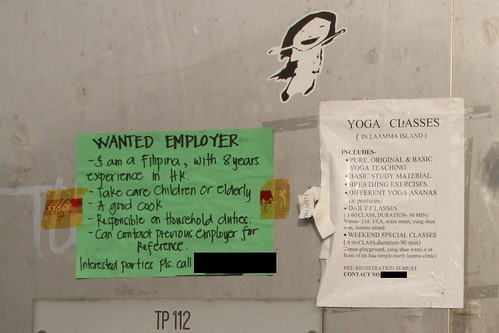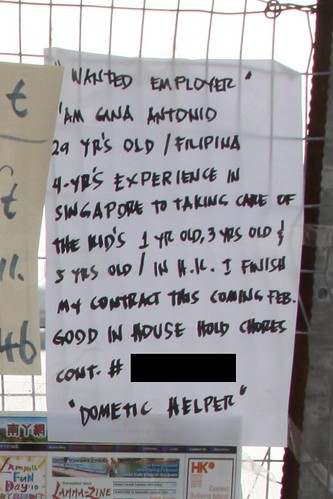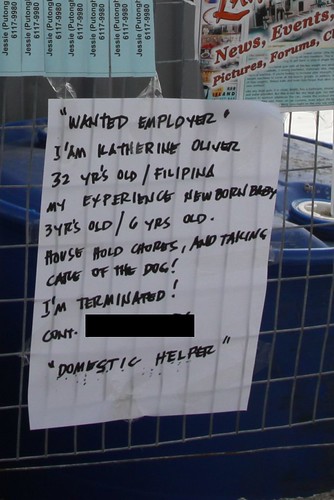If you spent yesterday with me wandering around Lamma Island, you might have seen some flyers like these, posted by Filipinas looking for work as domestic help.
For the middle class of Hong Kong, employing someone from a foreign country to live in your house full time and carry out domestic duties is perfectly normal, with the Hong Kong Government calling these migrants Foreign Domestic Helpers (FDH). An estimated 1 in 10 Hong Kong households employ a domestic helper – in 2007 there were 232,781 foreign domestic helpers working in Hong Kong, making up 3.39 per cent of the overall population of the city.
The desire for hired domestic help had roots in Hong Kong’s massive economic growth from the 1960s: when partnered with increased female participation in the workforce, this both reduced the time families had available for household chores, and increased their spending power. The Hong Kong government officially sanctioned immigration of foreign domestic helpers in 1969, and by the 1980s the practice was well entrenched in Hong Kong life for the middle class.
It seems like most families in Hong Kong employ their helpers through an employment agency: I visited the suburb of San Po Kong I stumbled upon one such agency. Their front window display looks like a real estate agent, except instead of photos showing tarted up houses, it was a display of smiling foreign women in maid uniforms.
The majority of helpers are from either the Philippines or Indonesia, who receive a visa to enter Hong Kong once they have signed an employment contract with a local family. All contracts are exactly the same, being the “Standard Employment Contract” specified by the Hong Kong government. The helper is employed for a fixed 2 year period, with the only part of the contract that need filling in being the name and address of the local employer, and the agreed wage to be paid. The requirements in the contract are very specific, covering such items as:
- Duties: the helpers is restricted to carrying out domestic duties: household chores, cooking, baby-sitting, child-minding and looking after aged persons in the household. They are not allowed to carry out any work for people outside the employer’s household, and may not take up any other kind of employment.
- Minimum wage: it is set by the government and adjusted periodically – in 2008 the minimum wage for helpers was HK$3,580 per month, or just US$459. For comparison, the average monthly wage in the Philipines is around 12,000 Philippine Pesos, or US$280 a month – a great deal less. Unlike the minimum wage in Australia and other countries, Hong Kong’s minimum wage moves both up and down, however for helpers their wage is set at the start of the contract and does not change.
- Accommodation: helpers are required to be given free room and board by their employer. That might sound like a benefit, but the contract also says helpers are not permitted to permitted to live outside of their employer’s residence. Well off families may provide their helper with a small room all to themselves, but for the majority of helpers their accommodation is sharing a bedroom with the younger children – the contract only states “reasonable privacy”. An option provided in the contract relates to food: if an employer decides against supplying it for free, a food allowance must be paid of no less than HK$750 per month.
- Transport: the employer is required to pay all travel expenses for their helper to reach Hong Kong from their country of origin, as well as paying for their journey back home at the end of the contract.
- Health care: the employer is required to pay for all health care expenses for their helper.
- Termination: either party can end the contract by giving one month’s notice in writing, the employer may also pay one month’s wages in lieu of written notice.
Despite what reads like gruelling conditions, foreign domestic helpers are still entitled to some time off: helpers are not required to work on Hong Kong statutory holidays, and they must receive one rest day per week, where the rest day is a continuous period of 24 hours. A common meeting place for Hong Kong’s Filipina population is Statue Square in Central. (photo from Wikipedia)

Despite the rest day requirement, the government has some rather suggestive wording in their documentation…
Q: Can I ask my helper to perform duties after he/she returns home on his/ her rest day?
A: You should not compel your helper to perform duties on his/her rest days. However, he/she may work voluntarily on his/her rest days.
In addition to rest days, helpers receive paid annual leave. In reality it is a pittance: they get 7 days/year after 1 year of service, increasing to 10 days/year for 5 years of service, and a maximum of 14 days for 9 years of service. It makes 4 weeks of annual leave look really good!
Once the 2 year contract comes to an end, a helper is required to either renew their employment contract, or sign a new contract with a new employer. Around Lamma Island I found a number of flyers posted by Filipinas who are currently in Hong Kong, and are looking for a follow up position after their current contract ends.
Even if both parties agree to renew the employment contract, it isn’t a simple case of signing a new piece of paper and carrying on: Hong Kong law requires the helper to return to their country of origin for a period of no less than 7 days, and then return to Hong Kong using a new visa.
This trip might be made at the expense of the employer, but it isn’t being made as a favour to the helper. The logic behind the trip is tied to Hong Kong’s “right of abode” law, eligibility for permanent residence is defined in the Immigration Ordinance as:
A person not of Chinese nationality who has entered Hong Kong with a valid travel document, has ordinarily resided in Hong Kong for a continuous period of not less than seven years and has taken Hong Kong as his place of permanent residence
The 2 year limit of stay ensures that the residence requirement can never be met by a foreign domestic helper, but surprisingly enough the law gets even more discriminatory:
A person shall not be treated as ordinarily resident in Hong Kong :
during any period in which he remains in Hong Kong-
[snip]
- while employed as a domestic helper who is from outside Hong Kong; or
[snip]
For foreign domestic helpers, the final cherry on the shit sundae is what happens if their contract is terminated.
If terminated after a dispute with their employer, a helper will be left with one month’s wages in lieu of written notice, nowhere to live due after being booted out of their live-in arrangement with their employer, and no other forms of legal employment available due to the terms of their visa.
Desperation then sets in – without a valid contract, the helper has two weeks to find a new position as a domestic helper, or be forced back to their home country – at least their former employer still has to pick up the tab.
Despite the doom and gloom, life as a foreign domestic helper doesn’t have to be horrible – a number of my Hong Kong relatives employ helpers to care for their young children and during my holiday with them I saw that the arrangement can be positive for both parties: the workload being less onerous than similar full time jobs, and the wages paid enable helpers to support their own families back at home.
Unfortunately, happy outcomes like this are based on the goodwill of employers: you can see how how foreign domestic helper contracts in Hong Kong are extremely one sided, with little protection provided for helpers exploited by those with less than noble intentions. In abusive situations many helpers are afraid to speak out, knowing that employers have the ability to terminate their contract on the spot, possibly forcing them out of Hong Kong for good.
Further reading
Here are a few more resources for those wanted to read on.
- Sample Employment Contract from the Immigration Department
- Foreign Domestic Helpers in Hong Kong: Towards Equality of Rights: a paper by Ronald Mok of the University of Queensland
- Should Foreign Domestic Helpers be Allowed Permanent Residency in the HKSAR?: an article by Ronald Yu and published by the Law Society of Hong Kong
- List of Frequently Asked Questions from the Immigration Department






I’ve since found two more articles on the topic:
– http://jasonyng.blogspot.com/2011/06/maid-in-hong-kong-part-1.html
– http://jasonyng.blogspot.com/2011/07/maid-in-hong-kong-part-2.html
And:
– http://vannoordadventures.blogspot.com/2010/01/maid-in-hong-kong-part-1-of-3.html
– http://vannoordadventures.blogspot.com/2010/01/maid-in-hong-kong-part-2-of-3.html
– http://vannoordadventures.blogspot.com/2010/01/maid-in-hong-kong-part-3-of-3.html
Pingback: Books for learning Hong Kong Cantonese - Checkerboard Hill